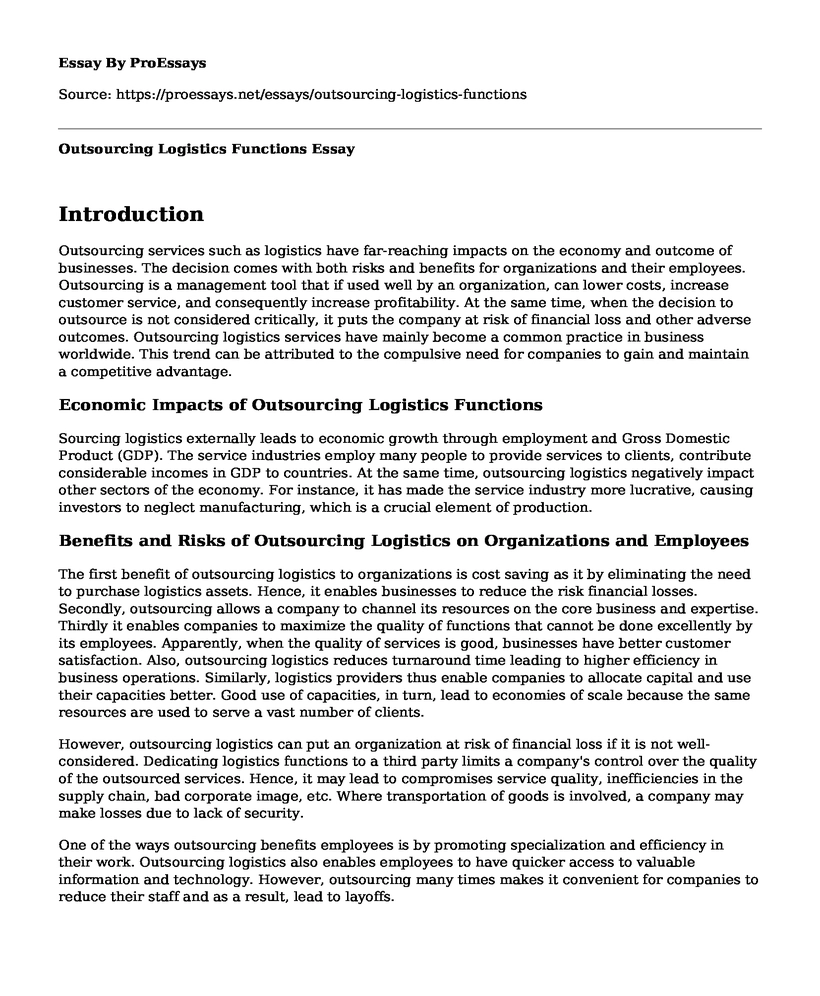Introduction
Outsourcing services such as logistics have far-reaching impacts on the economy and outcome of businesses. The decision comes with both risks and benefits for organizations and their employees. Outsourcing is a management tool that if used well by an organization, can lower costs, increase customer service, and consequently increase profitability. At the same time, when the decision to outsource is not considered critically, it puts the company at risk of financial loss and other adverse outcomes. Outsourcing logistics services have mainly become a common practice in business worldwide. This trend can be attributed to the compulsive need for companies to gain and maintain a competitive advantage.
Economic Impacts of Outsourcing Logistics Functions
Sourcing logistics externally leads to economic growth through employment and Gross Domestic Product (GDP). The service industries employ many people to provide services to clients, contribute considerable incomes in GDP to countries. At the same time, outsourcing logistics negatively impact other sectors of the economy. For instance, it has made the service industry more lucrative, causing investors to neglect manufacturing, which is a crucial element of production.
Benefits and Risks of Outsourcing Logistics on Organizations and Employees
The first benefit of outsourcing logistics to organizations is cost saving as it by eliminating the need to purchase logistics assets. Hence, it enables businesses to reduce the risk financial losses. Secondly, outsourcing allows a company to channel its resources on the core business and expertise. Thirdly it enables companies to maximize the quality of functions that cannot be done excellently by its employees. Apparently, when the quality of services is good, businesses have better customer satisfaction. Also, outsourcing logistics reduces turnaround time leading to higher efficiency in business operations. Similarly, logistics providers thus enable companies to allocate capital and use their capacities better. Good use of capacities, in turn, lead to economies of scale because the same resources are used to serve a vast number of clients.
However, outsourcing logistics can put an organization at risk of financial loss if it is not well-considered. Dedicating logistics functions to a third party limits a company's control over the quality of the outsourced services. Hence, it may lead to compromises service quality, inefficiencies in the supply chain, bad corporate image, etc. Where transportation of goods is involved, a company may make losses due to lack of security.
One of the ways outsourcing benefits employees is by promoting specialization and efficiency in their work. Outsourcing logistics also enables employees to have quicker access to valuable information and technology. However, outsourcing many times makes it convenient for companies to reduce their staff and as a result, lead to layoffs.
Why the Increase in Outsourcing?
The apparent increase in outsourcing of logistics is attributed to the eminent pressure for businesses to minimize interruptions and costs. The reduced operating costs and efficiency that comes with outsourcing the functions give companies a competitive advantage. Organizations peg the decision to outsource a myriad of factors within their business environment. Moreover, the global business environment keeps changing because of changing customer preferences, shorter product life cycles, technological innovation, and globalization. Consequently, organizations are increasingly outsourcing most of their value-added activities to dedicate more of their resources in the specialization of processes. As such, they have to partner with other businesses for success. The supply chain is one of the areas that the new developments have impacted.References
Jazairy, A., Lenhardt, J., & von Haartman, R. (2017). Improving logistics performance in cross-border 3PL relationships. International Journal of Logistics Research and Applications, 20(5), 491-513.
Kalinzi, C. (2016). Outsourcing (Logistics) Services and Supply Chain Efficiency-A Critical Review of Outsourcing Function in Mukwano Group of Companies.Konig, A., & Spinler, S. (2016). The effect of logistics outsourcing on the supply chain vulnerability of shippers: Development of a conceptual risk management framework. The International Journal of Logistics Management, 27(1), 122-141.
Cite this page
Outsourcing Logistics Functions. (2022, Mar 29). Retrieved from https://proessays.net/essays/outsourcing-logistics-functions
If you are the original author of this essay and no longer wish to have it published on the ProEssays website, please click below to request its removal:
- Nursing-Statement of Purpose
- Essay Sample on Job Satisfaction & Organizational Commitment: Distinct Yet Related
- Essay Sample on Age Discrimination in the Workplace: A Common Problem
- Essay on Hot Working Process: Deforming Metals Above Recrystallization Temperature
- Paper Example on Fiedler's Contingency Theory: Analysing Employee Performance
- Internship at Erk Tech: Gaining Insight Into IT Market - Research Paper
- Supply Chain: Logistics for Efficient Storage and Transportation - Essay Sample







